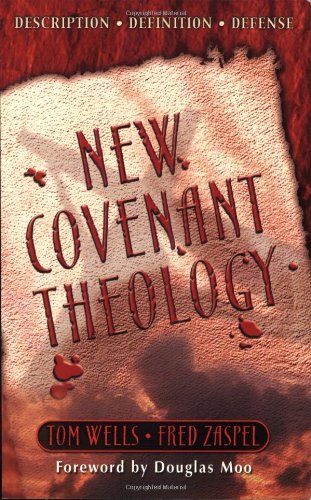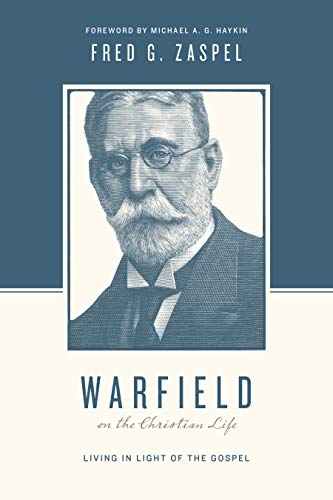
Quotes by Fred Zaspel
In Christ, Moses reaches maturity and emerges in full bloom. Moses’ law still has relevance, but only as it comes to us from the hands of the Lord Jesus. Christians today must still read Moses, and for great profit, but when they read him they must be careful to wear their Christian lenses. Moses’ law is not simply incorporated into the New Covenant as it was revealed through Moses – it is fulfilled, advanced, and brought to completion.
Reformed interpreters generally must speak (in so many words) of the fulfillment of the ceremonial law, the cancellation/abrogation of the civil law, and the continuance of the moral law. But all this is confusing and completely unnecessary if the whole of the law may be viewed as taken up into Christ and given His new and authoritative interpretation. With this, then, “every detail” of the law (of Moses!) may be observed by the New Covenant believer in precisely the same way: namely, in the way it comes to him from the hands of Christ.
What Jesus has to say has an eschatological significance to it. He has not merely reissued Moses. Nor has He abrogated Moses. Nor has He merely replaced, intensified, or expanded him. Jesus “fulfilled” Moses.
Jesus came to bring about what Moses’ law anticipated. The law pointed forward to Him all along; He is its eschatological goal. Only in Him does it find its full significance and continuing validity; apart from Jesus’ interpretation of it, it has precisely no enduring use. Just as Moses’ law advanced the law which God had “written on the heart” of man at creation, so also in Jesus’ teaching that advance is brought to full completion. In Jesus, Moses is “fulfilled.”
Christ brought the “full” eschatological intent of the law to final realization. Moses survives, but only as he is taken up into Christ.
[The early church] unanimously understood Jesus’ teaching as an addition to Moses’ law, an advance whose requirements were significantly higher. The common idea was that Christ’s teaching completed the law of Moses – it finished what was begun at Sinai. In this sense there is no destruction or even contradiction of Moses but a growth as from seed to tree.
The justification for works on the NCT (New Covenant Theology) seems to be at least fivefold. First, it has seemed to some of us that if the New Testament is the apex of God’s revelation, then we ought to read the earlier parts of Scripture in its light. The point seems self-evident, but for some of us it was nevertheless hard to arrive at. Second, the NT is very explicit in making believers “slaves” of Jesus Christ. The implications of this are far reaching; here we simply note the fact. Third, a nagging question arises when OT law becomes too prominent in discussions of Christian morals and ethics. The question is: Which is the higher revelation of the character of God, the Ten Commandments or the person, work and teaching of Jesus Christ?… A fourth thing calls for an understanding of NCT: the renewed emphasis in our day on exegetical and biblical theology as a source of systematic. This has inevitably called into question the way Christians read their creeds and confessions. Finally, in one of the odd providences that the Lord sometimes sends our way, those who defend New Covenant Theology find themselves falling in with an emphasis that has been prominent throughout church history.
The sign and seal of the Old Covenant has given way to the reality of Christ in the New Covenant (Matt. 26:28). The Sabbath no longer has significance as a day; its significance is in that to which it pointed – in Him who gives rest (Matt. 11:28) and in Whom we have ceased from our works (Heb. 4:10). For those who rest in Christ, every day is a Sabbath (cf. Rom. 14:5).
Taken from "New Covenant Theology" by Tom Wells and Fred Zaspel, p. 236, © 2002 New Covenant Media, Used by permission of New Covenant Media, 5317 Wye Creek Drive, Frederick, MD 21703-6938. http://www.newcovenantmedia.com/home.php.
[Like] all the ancient Mosaic institutions, the Sabbath has reached its fulfillment in Christ (Col. 2:17; Heb. 4), and it is by trusting in Him that we preserve its significance today.
Taken from "New Covenant Theology" by Tom Wells and Fred Zaspel, p. 235, © 2002 New Covenant Media, Used by permission of New Covenant Media, 5317 Wye Creek Drive, Frederick, MD 21703-6938. http://www.newcovenantmedia.com/home.php.
Regard the Mosaic endorsement of capital punishment. Can this be justified on New Covenant grounds? Yes, in two ways. First, in Romans 13:4, Paul speaks of our governmental leaders who do not “bear the sword in vain.” Obviously the sword is not used for correction but for execution, and Paul acknowledges this right. Paul does not bother to provide an extensive list of what crimes are rightly punishable by death, but the right itself is assumed. Also, there is the pre-Mosaic stipulation that murder is an attack on God’s image and, therefore, worthy of death (Gen. 9:6). Murder as a personal attack on God is a notion that is not confined to the Old Covenant alone; it remain a capital offense in every age.
Taken from "New Covenant Theology" by Tom Wells and Fred Zaspel, page 158-159. (c)2002 New Covenant Media, Used by permission of New Covenant Media, 5317 Wye Creek Drive, Frederick, MD 21703-6938. http://www.newcovenantmedia.com/home.php.
God has said that He would save via preaching. He in fact has saved through preaching, and He does save through preaching. We needn’t doubt that He can and will. And we needn’t invent new means to help Him do what He does so well all by Himself. We are obliged to trust Him to work via the means He has promised to bless.
But the Gordian knot is easily undone when it is understood that Jesus is to Moses what the butterfly is to the caterpillar. Moses is not struck down. Moses did not “fail” (Lk. 16:17). Nor was he “destroyed” (Mt. 5:17). Moses was “fulfilled.” In Christ, Moses reaches maturity and emerges in full bloom. Moses’ law still has relevance, but only as it comes to us from the hands of the Lord Jesus. Christians today must still read Moses, and for great profit, but when they read him they must be careful to wear their Christian lenses. Moses’ law is not simply incorporated into the New Covenant as it was revealed through Moses-it is fulfilled, advanced, and brought to completion.
Taken from “New Covenant Theology” by Tom Wells and Fred Zaspel, © 2002 New Covenant Media, Used by permission of New Covenant Media, 5317 Wye Creek Drive, Frederick, MD 21703-6938, http://www.newcovenantmedia.com/home.php.
Saving faith is not a decision that is made, and it is not a mouthing of a certain formula. Even if the formula is recited in prayer, this is not saving faith. Manipulating a person to say go through certain motions and say certain words does him no good whatever. This is not saving faith. This is dangerous indeed. Can a man really be saved by saying “yes” to a series of questions? Have we done them any favor by allowing them to think so? This is a misunderstanding of saving faith. It is a confusion of professed faith with true saving faith. This mistake has resulted in the unprecedented number of false converts which this century of evangelism has produced. Decisions and numbers there are, but the “converts” are notoriously unconverted. This is a direct result of confusing decisions with true faith, and it is a blight on the church. It is also inevitable. And it is shameful. And it is harmful, for we have convinced unconverted people that they are safe.
The “Altar Call” – Is it helpful or harmful? Published by Word of Life Baptist Church, Pottsville, PA, 1998, All rights reserved.
The preacher’s duty is not to “get decisions.” His duty is to proclaim the good news and exhort men and women to go to Christ. This is the means which God uses to save. We preach, and God Himself uses the word preached to “get the decision.” (What a woefully inadequate term that is! Saving faith is so much more than a “decision.” It is running for rescue!) These roles must never be confused… The role of the preacher is to exhort men and women to faith in Christ. That is all. And that is enough. God is well able to do everything else.
The “Altar Call” – Is it helpful or harmful? Published by Word of Life Baptist Church, Pottsville, PA, 1998, All rights reserved.
As far as the apostles were concerned, they were as weak as any other men. They were uneducated, very ordinary men. Yet they are given this privileged position: they will deliver the Word of God through the Son to the world. From God the Father, through the Son, through the Spirit, and through the apostles to the world. In this sense, the apostles are “foundational” to the church… Theological and ethical instruction from the apostles is universally binding. Indeed, it is “from God to us.”
There are serious dangers in the modern invitation system. It is not a Biblical practice but a relic of nineteenth-century American evangelical tradition. It confuses the nature and object of saving faith. It confuses mere professions of faith with true, saving faith. It fosters false assurance. It distracts thinking away from the workings of God in the inner man. It mistrusts the God-appointed means of preaching and the power of the Holy Spirit working through the Word. It mistakes the role of the preacher. And it rests on an unscriptural view of human ability.
The “Altar Call” – Is it helpful or harmful? Published by Word of Life Baptist Church, Pottsville, PA, 1998, All rights reserved.
This modern practice has tended to promote false assurance… We all know so many who “know” they are Christians, because they were baptized as infants or as adults for that matter. The same is true of countless people who have “walked the aisle.” They were assured that if they would “come forward” and “make a decision” they could be saved. They came, and there some well-intentioned personal worker convinced them that because they came and answered “yes” to the various questions and then prayed “the sinner’s prayer” that now they are saved and no one should ever make them doubt it! Then they left. And they went back to the same old life they had. They made no real public profession of Christ, but because they did as they were instructed they “know” they are safe. This is a needless problem which we have created.
The “Altar Call” – Is it helpful or harmful? Published by Word of Life Baptist Church, Pottsville, PA, 1998, All rights reserved.
The modern invitation system…reveals a misunderstanding of the role of the preacher. The preacher’s duty is not to “get decisions.” His duty is to proclaim the good news and exhort men and women to go to Christ. This is the means which God uses to save. We preach, and God Himself uses the word preached to “get the decision.” (What a woefully inadequate term that is! Saving faith is so much more than a “decision.” It is running for rescue!) These roles must never be confused… The role of the preacher is to exhort men and women to faith in Christ. That is all. And that is enough. God is well able to do everything else.
The “Altar Call” – Is it helpful or harmful? Published by Word of Life Baptist Church, Pottsville, PA, 1998, All rights reserved.
The modern altar call further runs the risk of confusing the idea of mediatorship. Who is our only mediator? With whom does the sinner need to do business if he is to be saved? Must he talk to you? To me? No, he must do business with Christ, for He alone is the one who can bring us to God. But instructing a man to “come and talk to a personal worker” may well confuse matters. It again distracts from the One of Whom he should be thinking. The sermon itself is the invitation, and it gives direction to Christ and to no one else.
The “Altar Call” – Is it helpful or harmful? Published by Word of Life Baptist Church, Pottsville, PA, 1998, All rights reserved.
No one is ever saved “as a result” of an altar call. We are saved only as a result of the gospel… We don’t want them to think that in order to be saved they must walk an aisle. No! We want them to know that if they look to Christ even while they are seated they will be saved. And so we must tell them that. We must make the message very plain that they must go to Christ, and to go to Him requires no physical movement whatever only a look of the soul… This is too important a matter to erect needless obstacles or distractions. They must be directed not to a geographical location in a building. They must be directed to Christ.
The “Altar Call” – Is it helpful or harmful? Published by Word of Life Baptist Church, Pottsville, PA, 1998, All rights reserved.
A man’s willingness (or unwillingness) to come to the front of a church building says nothing about his willingness to come to Christ. Walking in front of a crowd has nothing at all to do with the conversion process, and we have no right to create such a false category of “public declaration of faith” and thus pronounce the Biblical requirement fulfilled. We have every right indeed, we have divine right to require baptism as this outward and public profession of faith. And we have every right to expect that faith to continue to be evident in life. But the altar call is another matter entirely. It is an artificial, man-made requirement which, by virtue of its human origin, is a matter of no consequence whatever.
The “Altar Call” – Is it helpful or harmful? Published by Word of Life Baptist Church, Pottsville, PA, 1998, All rights reserved.
The altar call is “old fashioned” in only a very relative sense. It is old fashioned to us at this end of the twentieth century, but it first arose more than eighteen centuries after Christ. Now this may not prove that the altar call is wrong, but it surely demonstrates that the non-practice of the altar call is not wrong. If neither Jesus nor His apostles employed the method, and if they never commanded such to be done by the church, then it obviously cannot be wrong to decide against the more modern method. It is not a question of Biblical necessity but of modern custom and convenience. A church which refuses the practice can never be criticized for that refusal; indeed, such a church is at that point more in line with the apostolic church than are those churches which have adopted it.
The “Altar Call” – Is it helpful or harmful? Published by Word of Life Baptist Church, Pottsville, PA, 1998, All rights reserved.
In each case (in Matthew) there is no mere parallel being drawn: there is eschatological transcendence. That, Jesus, for example, is not merely another great Solomon: He is “greater than Solomon” (12:42). Likewise, He is “greater than the temple” (12:6), “greater than Jonah” (12:41). In the mist of all this, the clear implication is that He is also David’s greater son (12:3-4); in fact, this is precisely Jesus’ point in 22:45. Further, He is “Lord even of the Sabbath” (12:8). Similarly, Jesus is not merely a son of Abraham, privileged as that is. He is the son of Abraham par excellence, the one in whom the patriarchal promises reach their goal (1:1). He is not simply a representative of Israel – He is the true Israel (2:15, 16-18). His name is “Joshua,” but He is greater than His forebear and brings a greater deliverance: “for He shall save His people from their sins” (1:21). Moreover, it would have been very wrong to erect booths for Moses, Elijah, and Jesus: these two other men, great as they were, deserve no equal place with Jesus. “Hear Him” was the word from Heaven (17:5). He is greater than Elijah and greater than Moses – greater than the prophets and even the law itself.
In hermeneutical debate it is often asked whether it is right to assume that all of Moses’ law remains unless it is specifically abolished, or if it is right to assume that it is all abolished unless it is specifically stated to remain. In one sense the question is irrelevant, for it is the entire Old Covenant that is abolished (2 Cor. 3) and not just certain categories of the law. But in another sense the question is wrong, for Christ’s claim (Mt. 5:18-20) is that all of Moses is to be continually taught and observed-only, in the new form He gives it. It is all of the law that remains, but it is to be obeyed as interpreted by Christ.


